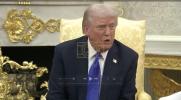טראמפ רעדט פון די אמעריקאנע אטאקעס אויף ווענעזועלא דראג גרופס


President Donald Trump has strongly defended a series of U.S. military strikes against suspected drug-smuggling vessels in the Pacific Ocean, framing the campaign as a critical response to what he called a “national security problem” claiming hundreds of thousands of American lives.
“These are not just drug dealers — they’re narcoterrorists,” Trump said during remarks at the White House. “They killed 300,000 Americans last year. This is a national security problem, and we’re treating it like one.”
The operations, now in their eighth phase as of October 22, 2025, have targeted maritime trafficking routes used by transnational cartels. U.S. defense officials confirmed that at least 37 suspected traffickers have been killed since the first strikes began in early October, with no reported U.S. casualties. The vessels were intercepted and destroyed in international waters following intelligence assessments linking them to large-scale narcotics smuggling operations.
Trump’s directive marks a sharp escalation from previous administrations’ counter-narcotics policies, which focused primarily on interdiction and arrests. Under the new rules of engagement, the U.S. military has authority to carry out kinetic strikes against cartel-linked targets designated as terrorist entities — part of the administration’s broader “America First” doctrine emphasizing decisive, unilateral action to protect national interests.
“This is about defending the American people from the poison flooding across our borders,” Trump said. “We’re not going to wait for another 300,000 to die before acting.”
Officials at the Department of War and the Pentagon have described the operations as precision-driven and intelligence-based, aimed at disrupting transnational supply chains responsible for producing and transporting fentanyl and other synthetic drugs into the United States. The campaign follows months of maritime surveillance activity and coordinated interdictions across the Caribbean and Pacific corridors.
Critics, however, have voiced concerns over the legality and transparency of these operations, questioning the use of lethal force in international waters and the potential diplomatic consequences for regional allies. Human rights organizations have also called for greater oversight and public reporting on the strikes.
Despite growing scrutiny, Trump and his national security team remain resolute. “There will be no refuge for these people,” a senior administration official said. “They have declared war on our citizens — and we’re responding in kind.”
With the death toll from narcotics overdoses continuing to rise and cartels expanding their global networks, the administration’s aggressive posture signals a historic turning point in U.S. counter-narcotics policy — one where the fight against drug trafficking is now being waged as a war.
גאלערי
ווידעאס